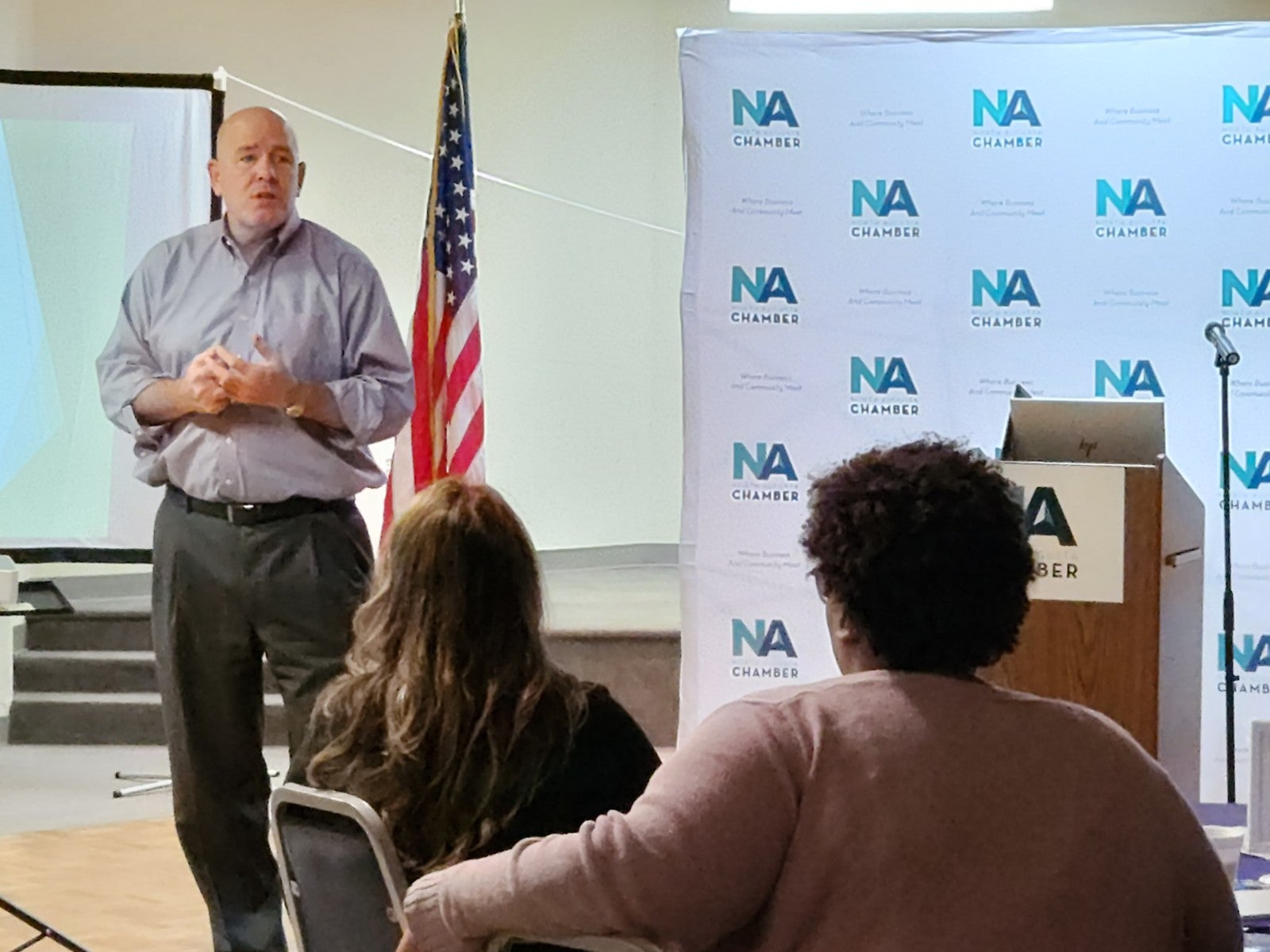Homelessness and how to prevent it took centerstage at the North Augusta Chamber of Commerce’s September Good Morning North Augusta breakfast.
Business leaders heard from Derek Dugan, development director with the Salvation Army of Augusta and Vicki Miller-McCarthy, coordinator of Social Services for the Aiken County School District.
Miller-McCarthy had been the district’s lead attendance supervisor, putting her in direct contact with homeless students, and those at risk.
She said in the 2020-2021 school year, the district had 258 students listed as “transitional.” During the 2021-2022 school year they assisted 265 such students. She said in just the first four weeks of school they have identified more than 70 children they consider homeless. She estimated they could have more than 400 this school year.
All school districts must follow the McKinney Vento Homeless Act. Miller-McCarthy said it has three primary goals.
“That a student who was identified as being homeless that we immediately enroll them, number one. That we try to keep them in their school of origin number two, and that we protect their rights,” she said. “It is our job in the school district to identify our homeless students, not to categorize them and put them aside but to make sure that their rights are being protected.”
MORE: Congressman tours Bon Air Apartments
McKinney Vento also requires districts to provide transportation to ensure all students can be picked up where they may be living, including shelters, motels or staying with family or friends, and transported to their schools.
“Under the McKinney Vento act, what we’re charged to do and what we’re committed to doing is making sure our children, and I keep saying our because sometimes people think that people just move into Aiken County because it looks better and we have more resources. But the majority of our homeless students are in Aiken County, they’ve been in Aiken County and we’re supporting Aiken County,” said Miller-McCarthy.
She said the Salvation Army operates an emergency shelter on Greene Street, but Aiken County and North Augusta need emergency shelters to help families who are homeless and affordable housing to help low-income families. She said opening a food pantry and soup kitchen in North Augusta would be helpful.
Dugan said there are some limitations to the Augusta emergency shelter. Except in extreme weather conditions, it is not a day shelter. It is open only at night. They also have a requirements people who need more than a short-term stay must meet.
“We have what we call the 3-6-9 program, 30, 60, 90 days. Benchmarks have to be met in order to continue staying in a shelter,” he said. “We do not want people to be reliant on staying in shelter. So, if they are not enrolled in social service, and they are not on the track to getting out of the homeless state, we do not allow them to stay in the shelter indefinitely.”
He said the Greene Street shelter is seeing the highest numbers of people in need than ever before. He said the number of families needing shelter has prompted them to devote one wing of the building to create five rooms specifically for a family.
MORE: New COVID-19 vaccine targeting omicron variants available
Becky Dearden of Serotta, Maddocks, and Evans CPAs and vice chairperson of the chamber, suggested business leaders at the breakfast arrange to take a tour of the shelter, especially the family rooms.
“It’s important for them, and it’s also important for their employees to see things that are happening in their communities that we normally wouldn’t say, I wouldn’t have ever been in a position to see the Salvation Army without them (SME), but it opened my eyes and it makes me want to make my community better,” she said.
Dugan offered one option to beef up affordable housing, set asides in new, multi-family projects.
“And so, if you have new apartment complexes, some set asides for the lower income voucher,” he said. “The apartments that would have a number of units that would just have to accept vouchers, having a certain number of set asides where they’re not identified within the complex is something that can help solve the homeless or low-income housing issues.”
He said the Salvation Army can provide a voucher of just over $600 to help cover the cost of housing.
Dugan is also part of the Augusta Homeless Task Force. He placed copies of the recently approved strategic plan on each table.
North Augusta Mayor Briton Williams was among those who took a copy of the 37-page plan.
“I want to read it. But a report by itself is great, but I don’t know what’s been done,” he said. “I haven’t found a community yet that’s really been able, I don’t think anyone has really got an answer for it yet. So, I think it’s good information, but I don’t know how you go about. I don’t have that answer.”
Dana Lynn McIntyre is a general assignment reporter for The Augusta Press. Reach her at dana@theaugustapress.com











